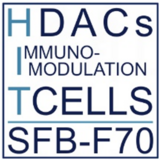International symposium of the special research program (SFB F70) "HDACs as regulators of T cell-mediated immunity in health and disease”
For our international symposium "Translating T cell immunology: Histone deacetylases - from basic research to clinical application" we have assembled a great line-up of speakers with talks covering chromatin & epigenetics, HDAC biology and function, clinical application of epigenetic inhibitors as well as a special session dedicated on characterizing regulatory mechanisms of T cell-mediated immunity using OMICS approaches.
List of Speakers
- Wayne Hancock
University of Pennsylvania, Philadelphia, Pennsylvania, PA, USA - Johan Henriksson
Karolinska Institutet, Huddinge, Sweden - Andrew Howden
University of Dundee, Dundee, UK - Ricky W. Johnstone
University of Melbourne, Parkville, Australia - Felix Meissner
University of Bonn, Bonn, Germany - Alexander Rudensky
Memorial Sloan Kettering Cancer Center, New York, NY, USA - John Schwabe
Leicester Institute of Structural and Chemical Biology, Leicester, UK - Christian Seiser
Medical University of Vienna, Austria - Virginia Shapiro
Mayo Clinic, Rochester, Minnesota, MN, USA - Golnaz Vahedi
University of Pennsylvania, Philadelphia, Pennsylvania, PA, USA - Femke van Wijk
University Medical Center Utrecht, Utrecht, The Netherlands - Anton Wutz
Swiss Federal Institute of Technology - ETH, Zurich, Switzerland
Programme
09:15 - 10:50 Session I: Chromatin & epigenetics
Chairs: Christian Seiser & Michael Bonelli
- 09:15 - 09.20 Welcome
- 09:20 - 10:05 Anton WUTZ: Histone deacetylase and nucleosome assembly complexes contribute to X chromosome inactivation in mouse embryonic stem cells
- 10:05 - 10:50 Golnaz VAHEDI: A multi-enhancer hub endows competence for T cell differentiation
10:50 - 11:20 coffee break
11:20 - 12:50 Session II: HDAC - function & structure
Chairs: Karl Kuchler & Wolfgang Reiter
- 11:20 - 12:05 John SCHWABE: Diverse structures, mechanisms and functions of class I HDAC complexes
- 12:05 - 12:50 Christian SEISER: Set-up of genetic models mimicking isoform-specific class I HDAC inhibitors
12:50 - 14:00 lunch break: lunch provided
14:00 - 15:45 Session III: HDAC-mediated control of T cell immunity
Chairs: Thomas Krausgruber & Valentina Stolz
- 14:00 - 14:45 Virginia SHAPIRO: HDAC3 represses cholesterol efflux during CD4 T cell activation
- 15:00 - 15:45 Wanye HANCOCK: Why Do Tregs Express Both HDAC1 and HDAC2, With Opposite Effects on Treg Function, in at Least 3 Multiprotein Coregulatory Complexes?”
15:45 - 16:15 coffee break
16:15 - 17:45 Session IV: Epigenetics and Clinical application
Chairs: Iris Gratz & Ashley Zhu
- 16:15 - 17:00 Femke VAN WIJK: Human Treg adaptation; location matters, …. or not?
- 17:00 - 17:45 Ricky W JOHNSTONE: Altered histone acetylation dynamics regulates tumor and immune cell phenotype and functions
09:15 - 12:05 Session IV: OMICS approaches in immunology
Chairs: Nicole Boucheron & Markus Hartl
- 09:15 - 10:00 Andrew HOWDEN: Mapping T cell environment sensors and signalling pathways using quantitative proteomics
- 10:00 - 10:45 Felix MEISSNER: Decoding Intercellular Immune Signaling Networks by Quantitative Proteomics
- 10:45 - 11:15 coffee break
- 11:15 - 12:05 Johan HENRIKKSON: Interpreting single-cell multiomics: new readouts and machine learning
12:00 - 13:00 CLOSING Session – keynote lecture
Chairs: Wilfried Ellmeier & Teresa Preglej
- Alexander RUDENSKY: Peripheral differentiation of Treg cells
Covid Regulations
We recommend wearing an FFP2 mask during the event. Covid positive tested individuals are not allowed to participate in the event.
Contact
